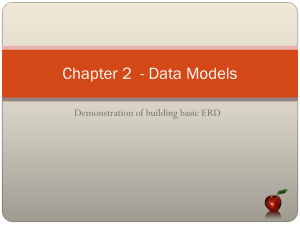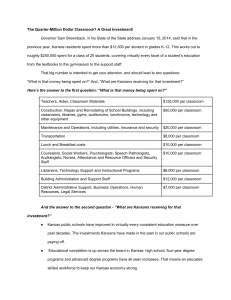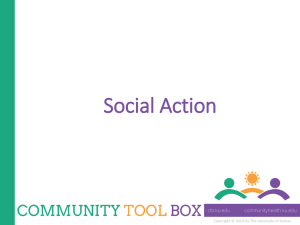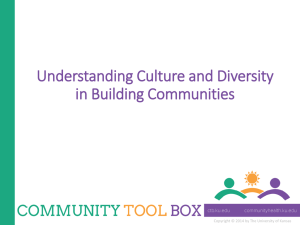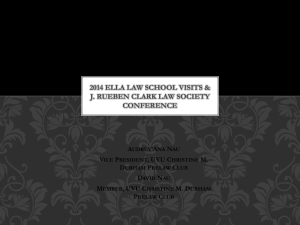United Way of Greater Kansas City 2015 Public Policy Positions
advertisement
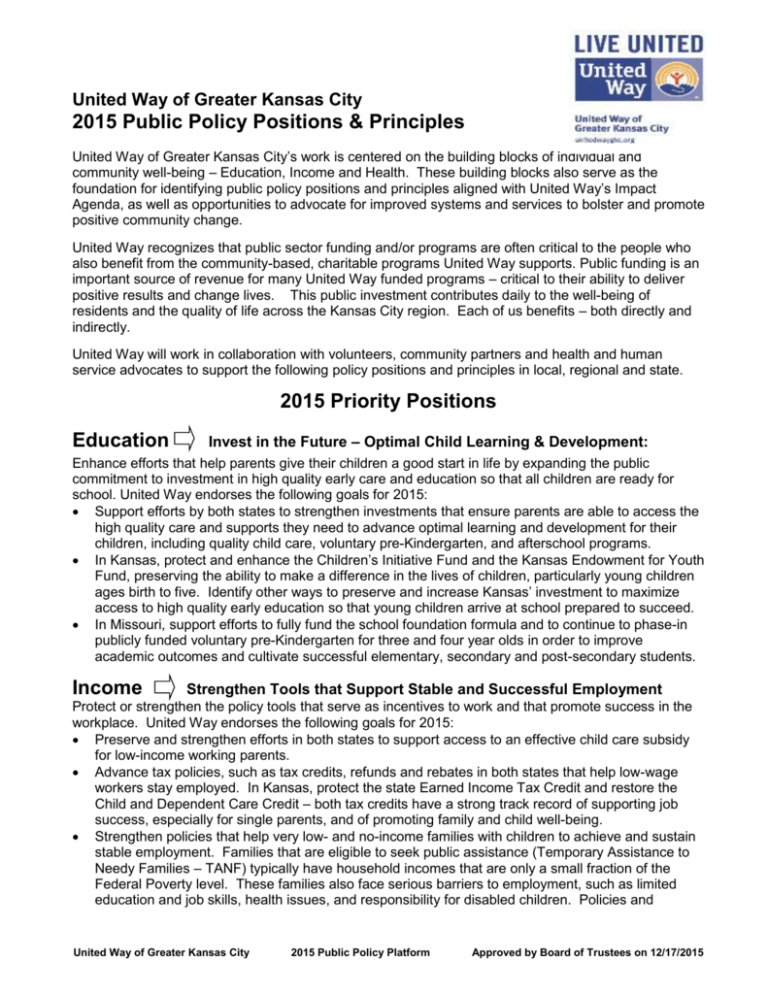
United Way of Greater Kansas City 2015 Public Policy Positions & Principles United Way of Greater Kansas City’s work is centered on the building blocks of individual and community well-being – Education, Income and Health. These building blocks also serve as the foundation for identifying public policy positions and principles aligned with United Way’s Impact Agenda, as well as opportunities to advocate for improved systems and services to bolster and promote positive community change. United Way recognizes that public sector funding and/or programs are often critical to the people who also benefit from the community-based, charitable programs United Way supports. Public funding is an important source of revenue for many United Way funded programs – critical to their ability to deliver positive results and change lives. This public investment contributes daily to the well-being of residents and the quality of life across the Kansas City region. Each of us benefits – both directly and indirectly. United Way will work in collaboration with volunteers, community partners and health and human service advocates to support the following policy positions and principles in local, regional and state. 2015 Priority Positions Education Invest in the Future – Optimal Child Learning & Development: Enhance efforts that help parents give their children a good start in life by expanding the public commitment to investment in high quality early care and education so that all children are ready for school. United Way endorses the following goals for 2015: Support efforts by both states to strengthen investments that ensure parents are able to access the high quality care and supports they need to advance optimal learning and development for their children, including quality child care, voluntary pre-Kindergarten, and afterschool programs. In Kansas, protect and enhance the Children’s Initiative Fund and the Kansas Endowment for Youth Fund, preserving the ability to make a difference in the lives of children, particularly young children ages birth to five. Identify other ways to preserve and increase Kansas’ investment to maximize access to high quality early education so that young children arrive at school prepared to succeed. In Missouri, support efforts to fully fund the school foundation formula and to continue to phase-in publicly funded voluntary pre-Kindergarten for three and four year olds in order to improve academic outcomes and cultivate successful elementary, secondary and post-secondary students. Income Strengthen Tools that Support Stable and Successful Employment Protect or strengthen the policy tools that serve as incentives to work and that promote success in the workplace. United Way endorses the following goals for 2015: Preserve and strengthen efforts in both states to support access to an effective child care subsidy for low-income working parents. Advance tax policies, such as tax credits, refunds and rebates in both states that help low-wage workers stay employed. In Kansas, protect the state Earned Income Tax Credit and restore the Child and Dependent Care Credit – both tax credits have a strong track record of supporting job success, especially for single parents, and of promoting family and child well-being. Strengthen policies that help very low- and no-income families with children to achieve and sustain stable employment. Families that are eligible to seek public assistance (Temporary Assistance to Needy Families – TANF) typically have household incomes that are only a small fraction of the Federal Poverty level. These families also face serious barriers to employment, such as limited education and job skills, health issues, and responsibility for disabled children. Policies and United Way of Greater Kansas City 2015 Public Policy Platform Approved by Board of Trustees on 12/17/2015 program strategies are needed that address education and training for today’s jobs and other barriers to employment. Support funding to ensure adequate staff capacity at Kansas and Missouri state agencies for timely processing of applications for critical health and human service needs, such as TANF, Supplemental Nutrition Assistance, medical coverage and child care assistance Health Expand Access to Healthcare Coverage Adopt policies that advance good health, because good health is something that impacts every part of life – from employee productivity and financial stability to academic achievement and civic engagement. Access to health insurance is critical to ensuring good health. United Way endorses the following goals for 2015: Improve health access especially for the low-income working poor and their families through the expansion of Medicaid in both Missouri and Kansas. In United Way’s five-county region, the number of uninsured exceeds six figures. The expansion of Medicaid would allow many of these residents to access more appropriate health care to meet their needs, rather than costly methods such as emergency room visits or waiting to seek help for serious health problems made worse by lack of early treatment. To address the mental health needs for a large number of the people served by this region’s community and public mental health centers who are typically not covered by Medicaid, expansion will result in eligibility for essential health benefits, including mental health and substance abuse treatment. Finally, failure to expand Medicaid will mean a significant negative financial impact for area hospitals that will lose tens of millions of disproportionate share public dollars which are set to be eliminated under the Patient Protection and Affordable Care Act beginning October 1, 2015. These dollars currently reduce hospitals’ costs for serving indigent patients. Protect or strengthen the health and mental health care safety net, including increased funding for community mental health centers where budgets have been drastically cut in recent years in both Kansas and Missouri. Support the extension of funding for the bipartisan-supported Maternal, Infant and Early Childhood Home Visiting Program (MIECHV) at its current annual funding level of $400 million. Our nation spends billions annually to address a host of health, educational and social challenges that at-risk families face, including poor birth outcomes, child abuse and neglect, childhood cognitive disabilities and poor school readiness and academic achievement. Scientific research demonstrates that these conditions can be reduced or prevented at a fraction of the cost with voluntary evidenced-based home visiting programs. Support the permanent extension of current funding levels for the Children’s Health Insurance Program (CHIP) aimed at kids in working families who do not qualify for Medicaid and whose families cannot afford private coverage. CHIP protects families’ economic security through lower out-of-pocket costs in general. States choose the level of cost sharing and premiums in CHIP and families’ out-of-pocket expenses cannot exceed 5 percent of their income. If funding is not authorized up to 2 million children across the country could fall through the cracks and lose coverage. 2015 Support Positions Support Improvements to Protect Abused Children in Missouri Advocates have worked tirelessly for years with the Missouri Children’s Division and the Missouri General Assembly to put in place the proper policies and funding to ensure the Division is nationally accredited. This has led to better outcomes for children, their biological families, foster families and adoptive families. To ensure that Missouri does not slide back in its efforts to support children who have been abused and neglected, the state of Missouri must continue to reach for the highest standards and maintain a high-quality, well-trained staff within the Children’s Division of the Department of Social Services in order to assure the best outcomes for the state’s abused children. Therefore, we United Way of Greater Kansas City 2015 Public Policy Platform Approved by Board of Trustees on 12/17/2015 support maintaining funding at least at the current level to ensure sufficient training and staffing levels for personnel in the Children’s Division within the Missouri Department of Social Services. Maintain Effective Federal Human Service Role Recognize and monitor the link between federal funding and oversight for a wide range of both public and nonprofit human services that benefit residents across the region. United Way of Greater Kansas City is part of a national United Way movement that works to Advance the Common Good across Education, Income and Health areas. United Way will support select federal policies as identified in partnership with United Way Worldwide. Protect our community’s strong foundation of giving by preserving the charitable giving deduction. Maintain Effective Nonprofit Sector Promote and protect the nonprofit sector’s ability to respond to the unique human needs of this region. United Way will monitor and work in partnership to address threats and/or opportunities to strengthen this region’s nonprofit human service sector. 2015 Standing Policy Principles Education – Policy Principles that ensure children and youth attain their full potential: Strengthen evidence-based programs to ensure children and youth across the developmental continuum from birth through high school graduation access the high quality programs that advance positive learning and development. Ensure parents and caregivers have the information or training that they need to protect and promote developmentally appropriate learning so that every child reaches adulthood ready to succeed. Support working families by strengthening funding and access to quality, affordable child care, afterschool programs, and other public efforts that assist working families. Income – Policy Principles that help people achieve financial stability and independence: Support programs, initiatives and policies that recognize the importance of postsecondary education/skills training to develop a strong workforce. Strengthen supports to help at at-risk, lowincome young people, families with children, the working poor and populations with lower rates of post-secondary completion overcome barriers to achieving long-term financial stability. Maintain effective state child care assistance or tax credits in recognition that access to child care is essential for allowing low-income parents to enter and remain in the workforce. Support policies that promote long-term economic stability, such as those that encourage savings incentives, tax credits, fair credit and lending, or other policies that advance asset development. Promote policies that remove barriers to reentry for persons convicted of crimes yet who are now putting their lives back on track. Maintain essential safety net programs to protect our most vulnerable – the homeless, frail elderly, those facing chronic poverty, physical and mental disabilities, or other challenges to life-sustaining basic needs. Health – Policy Principles that assist people to be healthy and safe at home and in community: Promote access to quality health care, and policies that foster healthy eating, healthy living and healthy choices as critical to strong child and youth development, workforce participation and healthy seniors. Support effective public health and mental health care coverage that is responsive to those in need, including children, persons with disabilities, seniors, the unemployed and those not insured through work. Maintain the highest standards for public programs that are designed to protect those who are victims of abuse or neglect – especially children and seniors in state adult and child protection systems. United Way of Greater Kansas City 2015 Public Policy Platform Approved by Board of Trustees on 12/17/2015
